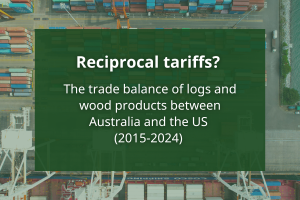The following is an edited extract from IndustryEdge’s mid-month Woodchip Trade Report, distributed with relevant data files to IndustryEdge’s clients in the middle of November 2022
Market Summary
- Australian woodchip exports totalled 400.3 kbdmt in September 2022, up 9.3% on the prior month
- Falling to 5.723 million bdmt year-ended September, annual exports were 11.6% higher than the prior year
- Month-on-month, hardwood chip exports fell 12.9% to 325.7 kbdmt, while softwood exports fell 43.7% to 74.6 kbdmt
- The average hardwood chip export price was AUDFob200/bdmt or a calculated USDFob152/bdmt
- Hardwood pulp prices were stable in September at USD855/t, with softwood pulp prices turned down and averaged USD920/t
Market Outlook
IndustryEdge’s 2023 outlook for hardwood chip exports remains STRONG. This outlook reflects the order-book for Australian exports, rather than a specific view of the faltering global and Chinese economies.
As we outlined last month, the Chinese economic outlook is quite poor, with growth in retreat and the housing sector bubble appearing to have burst. The implication for the Chinese domestic economy could be severe, with its export economy more impacted by the expected global recession and the obvious slowdown in consumption experienced over 2H22.
We remain watchful of the Chinese market for hardwood chips in that context.
The Bleached Eucalypt Kraft (BEK) price in China remained at the record USD855/t in October, with the Bleached Softwood Kraft (BSK) pulp price finally deteriorating, falling to USD940/t on average. Demand in China remains muted and the appreciation of the US dollar relative the Yuan is a dampener on increased pulp shipments.
Pulp shipments to China slowed over the last year (-6% +/- year-on-year), mainly due to the pulp price, while shipments of hardwood chip have exploded (+19%+/- year-on-year), as the marginal cost of producing pulp locally has been better.
There are curious dynamics at play right now.
Pulp buyers are sitting out of the pulp market, waiting for import prices to fall, providing the opportunity for China’s local pulp producers to increase their production, even though hardwood fibre is at or near its most expensive in history.
When the global pulp price falls, the cost of imported wood fibre is likely to remain higher than was previously likely. This is due mainly to demand being greater than supply. That means the marginal cost of pulp production in China will be higher than ever before, which many expect will arrest the fall of the global BEK pulp price.
In turn, that may mean some of the significant number of proposed pulp mills in China will not proceed because they will be demonstrated to be marginally inefficient over all time periods. Still, we expect the net expansion will be quite significant. Our annual capacity update will be available 1Q23.
China Pulp Prices: Jan ’12 – Sep ‘22 (USD/t)

Source: Hawkins Wright and IndustryEdge
Global Woodchip Market Update
It is difficult to escape the demand-sapping impact of global inflation when considering the global market update. Much as discussed above, there are specific circumstances for the hardwood chip market – most importantly, general scarcity. In normal times, the supply to demand imbalance would almost certainly result in hardwood chip prices being sustained, given they are at record levels.
While we can anticipate the imbalance will continue, it may be demand that softens for hardwood woodchips, with Australian supply likely to be the first impacted because it is typically the highest cost supply line into most of the major markets.
The chart below shows the clear delivered price differential between premium eucalyptus woodchips and the cheaper acacia and other hardwood from South-East Asian countries.
Woodchip Deliveries to China – Selected Countries: Jan ’20 – Sep ’22 (USDCif/bdmt)

Source: GTIS and IndustryEdge
|
USDCif/t |
Jul-22 |
Aug-22 |
Sep-22 |
|
Australia |
252.18 |
266.60 |
252.50 |
|
Chile |
244.36 |
259.87 |
268.63 |
|
Thailand |
194.37 |
181.28 |
212.24 |
|
Vietnam |
220.33 |
225.10 |
229.28 |
|
Weighted Average |
224.34 |
232.58 |
233.59 |
Australian Woodchip Exports
Australia’s combined annual exports of hardwood and softwood woodchips totalled 5.723 million bdmt year-ended September 2022. Hardwood chips totalled 4.667 million bdmt, 9.9% higher than a year earlier. Exports of softwood woodchips totalled 1.056 million bdmt. The chart displays total woodchip exports on a monthly basis.
Australian Woodchip Exports: Jan ’18 – Sep ’22 (kbdmt & AUDFob/bdmt)

Source: ABS, GTIS & IndustryEdge estimates
Note: March 2016 to May 2017 softwood chips are estimates
Australia’s average hardwood chip export price was AUDFob200/bdmt in September 2022, down 9.6% on the prior month. Average softwood chip export prices rose 4.9% to AUDFob219/bdmt. The hardwood price includes all volumes (plantation and native) and all end-uses (paper, tissue and biomass).
Woodchip Export Prices by Species: Jan ’18 – Sep ‘22 (AUDFob/bdmt)

Source: ABS, derived and IndustryEdge
*From January to June 2017 and in January 2019, softwood chip export data prices were officially unavailable
Based on month-end exchange rates, the table below shows the average price of Australia’s woodchip exports in US dollars for the last three months.
Australian Woodchip Export Prices: Jun ’22 – Sep ‘22 (USDFob/bdmt)
|
Species |
Jul ‘22 |
Aug ‘22 |
Sep ‘22 |
|
Hardwood |
162.93 |
160.49 |
151.84 |
|
Softwood |
159.19 |
143.97 |
142.28 |
Source: ABS, derived, RBA and IndustryEdge



